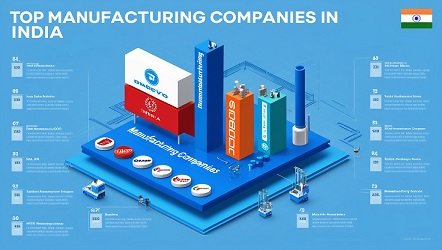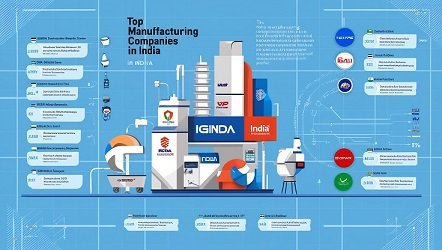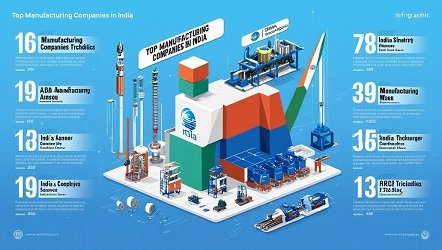Top Manufacturing Companies in India on 2025
India's manufacturing prowess has emerged as a global powerhouse, transforming from traditional industries to cutting-edge technological marvels. 🏭 From automobiles to pharmaceuticals, manufacturing companies in India not just dominating domestic markets but are making their mark on the international stage. With the government's 'Make in India' initiative gaining momentum, these industrial giants are reshaping the nation's economic landscape.
As we dive into India's most influential manufacturing companies, you'll discover how they're driving innovation, creating employment, and contributing to the country's GDP. Whether you're an investor looking for opportunities, a business enthusiast seeking insights, or simply curious about India's industrial growth story, this comprehensive guide will walk you through the titans of Indian manufacturing, their technological advancements, and their impact on the global supply chain.
Let's explore the key manufacturing sectors, leading conglomerates, and the technological transformation that's propelling India towards becoming a $5 trillion economy. 🚀

Key Manufacturing Sectors in India
Automotive Manufacturing Giants
India's automotive sector stands as a cornerstone of manufacturing excellence, with companies like Tata Motors, Maruti Suzuki, and Mahindra & Mahindra leading the charge. These companies collectively produce over 4 million vehicles annually, establishing India as the world's 4th largest automotive market.
Steel Production Leaders
The steel industry forms the backbone of India's manufacturing prowess, with major players including:
- JSW Steel
- Tata Steel
- SAIL (Steel Authority of India Limited)
- RINL (Rashtriya Ispat Nigam Limited)
Textile Industry Powerhouses
India's textile manufacturing sector employs over 45 million people directly, making it one of the largest employers in the manufacturing domain. Here's a snapshot of key players:
| Company | Specialization | Market Share |
|---|---|---|
| Arvind Ltd | Denim, Wovens | 25% |
| Raymond | Worsted Wool | 30% |
| Welspun India | Home Textiles | 20% |
Chemical Manufacturing Leaders
The chemical manufacturing sector contributes significantly to India's GDP, with companies like Reliance Industries, BASF India, and UPL dominating the landscape. These companies specialize in petrochemicals, agrochemicals, and specialty chemicals, serving both domestic and international markets.
Now, let's explore some of India's leading manufacturing conglomerates that have established themselves across multiple sectors.

Leading Manufacturing Conglomerates
Tata Group Manufacturing Portfolio
The Tata Group stands as India's largest conglomerate, with diverse manufacturing operations spanning multiple sectors. Their manufacturing arm includes:
- Tata Steel: World's 10th largest steel manufacturer
- Tata Motors: Produces passenger vehicles, commercial vehicles, and defense solutions
- Tata Chemicals: Manufacturing of chemicals, crop protection, and consumer products
- Tata Coffee: Asia's largest coffee plantation company
Reliance Industries Manufacturing Units
Reliance Industries dominates India's petrochemical and textile manufacturing landscape:
| Manufacturing Sector | Key Facilities |
|---|---|
| Petrochemicals | Jamnagar Refinery (World's largest) |
| Textiles | Naroda Manufacturing Division |
| Polymers | Hazira Manufacturing Division |
| Digital Hardware | Jio Manufacturing Units |
Aditya Birla Group Industrial Presence
The Aditya Birla Group has established itself as a manufacturing powerhouse with:
- Hindalco: World's largest aluminum rolling company
- UltraTech Cement: India's largest cement producer
- Grasim Industries: Leading manufacturer of VSF and chemicals
- Indian Rayon: Specialized in textiles and carbon black production
These conglomerates have consistently invested in technological advancement and sustainable manufacturing practices. Their manufacturing facilities employ hundreds of thousands of workers and contribute significantly to India's GDP. With increasing focus on technology-driven manufacturing processes, these companies are now embracing Industry 4.0 principles.

Technology-Driven Manufacturing Companies
Electronics Manufacturing Services
- Dixon Technologies - Leading mobile phone and LED TV manufacturer
- Flex India - Major player in electronic components
- Bharat Electronics Limited (BEL) - Government enterprise specializing in defense electronics
Defense Manufacturing Organizations
- Hindustan Aeronautics Limited (HAL) - Aircraft and aerospace components
- Bharat Dynamics Limited - Missile systems and underwater weapons
- Tata Advanced Systems - Private sector defense manufacturing
| Company | Specialization | Key Products |
|---|---|---|
| HAL | Aerospace | Fighter aircraft, helicopters |
| BEL | Electronics | Radar systems, communications |
| Tata AS | Defense | Drones, artillery systems |
Pharmaceutical Production Leaders
- Sun Pharmaceutical - Largest pharma company by market share
- Dr. Reddy's Laboratories - Pioneer in API manufacturing
- Cipla - Leader in respiratory medicine production
Smart Manufacturing Adopters
- Tata Motors - Implementation of Industry 4.0
- Asian Paints - Automated manufacturing facilities
- Maruti Suzuki - Advanced robotics integration
These companies have invested heavily in digital transformation, incorporating IoT sensors, artificial intelligence, and automation in their manufacturing processes. Their smart factories utilize real-time data analytics for predictive maintenance and quality control. Many have established innovation centers focused on developing cutting-edge manufacturing technologies.
The integration of advanced technologies has significantly improved production efficiency, with some companies reporting up to 30% increase in productivity. These organizations are setting new benchmarks in Indian manufacturing through their adoption of smart technologies.
Now, let's examine the key performance metrics that demonstrate the success of these technology-driven manufacturing approaches.
- Manufacturing Indian Companies
- Top 10 IT Companies of the World Know details
- Top cement company in india for Construction Industry
- Largest Steel Companies in India and production capacity
Performance Metrics
Annual Revenue Rankings
India's top manufacturing companies showcase impressive financial performance, with several firms crossing the $10 billion revenue mark. Here's a breakdown of the leading performers:
| Company | Annual Revenue (2022) | Sector |
|---|---|---|
| Reliance Industries | $99.1 billion | Petrochemicals |
| Tata Motors | $37.2 billion | Automotive |
| JSW Steel | $21.3 billion | Steel |
| Mahindra & Mahindra | $19.8 billion | Automotive |
| Hindustan Unilever | $15.4 billion | FMCG |
Export Contribution
The manufacturing sector's contribution to India's exports has been substantial, with key achievements including:
- 45% of total export value comes from manufactured goods
- Automotive exports reached $27 billion in 2022
- Pharmaceutical exports exceeded $24 billion
- Electronics manufacturing exports grew by 55% year-over-year
Employment Generation
Manufacturing companies continue to be major employment drivers:
- Direct employment: 27.3 million jobs
- Indirect employment: 54 million jobs
- Sector-wise employment leaders:
- Textiles: 45 million workers
- Automotive: 19 million workers
- Electronics: 13 million workers
Looking beyond these metrics, the regional distribution of manufacturing hubs plays a crucial role in understanding India's industrial landscape. The concentration of manufacturing facilities across different states reflects diverse industrial policies and infrastructure development.
Regional Manufacturing Hubs
Western India Manufacturing Belt
The western region of India, particularly Maharashtra and Gujarat, forms the backbone of India's manufacturing sector. Mumbai-Pune industrial corridor hosts over 40% of India's automotive manufacturing facilities, while Gujarat's Special Economic Zones (SEZs) house major petrochemical and textile industries.
| City | Key Industries | Major Companies |
|---|---|---|
| Mumbai | Chemicals, Textiles | RIL, Godrej |
| Pune | Automotive, Engineering | Tata Motors, Bajaj |
| Vadodara | Petrochemicals, Pharmaceuticals | IPCL, Sun Pharma |
Southern Manufacturing Clusters
Southern India's manufacturing prowess centers around:
- Chennai's automotive hub ("Detroit of India")
- Bengaluru's electronics manufacturing
- Hyderabad's pharmaceutical cluster
Northern Industrial Zones
The northern manufacturing belt stretches from Delhi-NCR to Punjab, featuring:
- Noida's electronics manufacturing ecosystem
- Gurugram's automotive hub
- Ludhiana's textile manufacturing cluster
The region boasts significant advantages:
- Strong logistics connectivity
- Skilled workforce availability
- Proximity to agricultural raw materials
Now that we've explored India's major manufacturing zones, let's examine how these regional hubs drive growth and innovation in the sector.
Growth and Innovation
Industry 4.0 Implementation
Leading Indian manufacturers are rapidly adopting Industry 4.0 technologies to enhance operational efficiency. Companies like Tata Motors and Mahindra have implemented smart manufacturing solutions, including:
- IoT sensors for real-time monitoring
- AI-powered predictive maintenance
- Automated quality control systems
- Digital twin technology
Sustainability Initiatives
Manufacturing giants are prioritizing environmental responsibility through innovative solutions:
| Company | Key Initiatives | Impact |
|---|---|---|
| Reliance Industries | Solar power integration | 30% energy reduction |
| Hindustan Unilever | Zero-waste facilities | 90% waste elimination |
| JSW Steel | Green steel production | 15% carbon reduction |
Research and Development Centers
Major manufacturers have established state-of-the-art R&D facilities across India:
- Maruti Suzuki's Innovation Center in Rohtak
- L&T's Technology Center in Chennai
- ITC's Innovation Lab in Bengaluru
Future Expansion Plans
The sector is poised for significant growth with planned investments:
- Development of smart manufacturing clusters
- Expansion into tier-2 and tier-3 cities
- Focus on electric vehicle manufacturing infrastructure
- Creation of specialized aerospace manufacturing zones
These advancements are positioning India as a global manufacturing hub, with companies investing heavily in next-generation technologies and sustainable practices. The integration of digital solutions and green manufacturing processes is expected to drive the next phase of industrial growth.
Conclusion
Manufacturing in India continues to evolve and strengthen, with companies across sectors pushing boundaries in technology adoption, innovation, and global competitiveness. From traditional conglomerates like Tata Group and Reliance Industries to emerging tech-driven manufacturers, these companies have positioned India as a global manufacturing powerhouse. The establishment of strategic manufacturing hubs across regions has further catalyzed growth and development in the sector.
The future of Indian manufacturing looks promising, with companies investing heavily in digital transformation, sustainable practices, and research & development. Whether you're an investor, industry professional, or business enthusiast, keeping track of these manufacturing giants offers valuable insights into India's industrial landscape. Their continued success and innovation will play a crucial role in realizing India's vision of becoming a global manufacturing hub.
